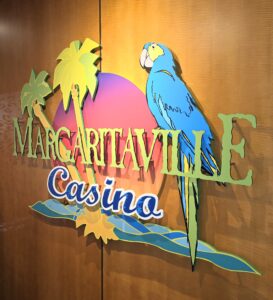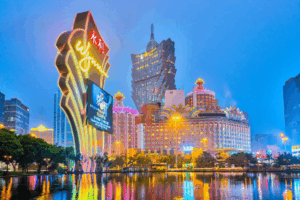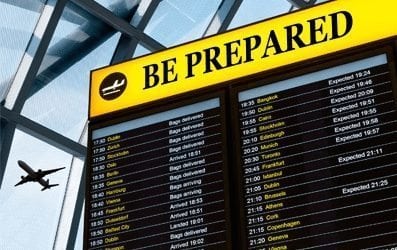
Previous articles in this series covered the following topics in the “General Information about X” (where “X” is the country/ies I will be visiting) document I prepare for every trip outside the U.S.”
- Part 1: obtaining foreign currency, currency-related scams, etc.
- Part 2: choosing, using and protecting the “plastic” you carry with you.
In Part 3, I will address tipping and awareness of and sensitivity to the culture(s) of the country/ies you will be visiting.
 Photo of Roman Forum taken by The Efficient Traveler’s wife © 2016
Photo of Roman Forum taken by The Efficient Traveler’s wife © 2016
“When in Rome, do as the Romans do” should (for the most part, see below) be the mantra of every international traveler; every vestige of ethnocentrism should be left at home. We are, after all, guests of the local culture(s) we visit. If we behave as we would expect a guest in our own homes to act, odds are we will be treated graciously and bring many wonderful memories back home with us. OK, I’m off my soapbox now but, seriously, this is an important mindset to adopt as we leave our home airspace.
Tipping
Tipping expectations vary widely, depending on the country one is visiting. In France, a tip (“service compris” in French) is included, by law, in one’s restaurant bill while in Japan, tipping is considered offensive. Also, one must consider the different settings in which a tip may or may not be expected and whether the use of one currency is favored over another.
Ask a Roman
True story…. My wife and I went on a 22-day tour (no longer available, unfortunately) of China. In the “Travel Guide” provided and printed by the tour company was a section titled “Tipping & Gratuity.” The only information in this section besides advising us that a tip of 1 Yuan might be expected at public washrooms was the following (verbatim as printed):
“ALL TIPS FOR TOUR GUIDES/DRIVERS ARE PAID IN FULL.”
What would this mean to you? Not a whole lot of room for ambiguity, right? Not so fast….
As the time for our Peking visit drew to an end, our country guide got on the tour bus microphone and said, “Let’s thank our driver, _____; didn’t he do a great job in Beijing traffic?” (No problem…applause…Beijing traffic had, indeed, been horrendous and he, indeed, had displayed nerves of steel.) But then she went on to say, “If you’d like to give (name) a tip, he’ll be standing by the door as you leave the bus at the airport.” Wait, what? I dutifully dug into my wallet for some Yuan to avoid an awkward moment at the bus door but wondered what was going on. After a domestic flight from Beijing to Xian (awesome!), we met our first city guide and our new bus driver.
Two days later, as we were leaving for the airport, our country guide again took the tour bus microphone and said, “If you’d like to give (name), your city guide and (name), your bus driver, a tip for the service they’ve provided you the past two days, they will be standing by the door as you leave the bus.” Cognitive dissonance was now kicking in with a vengeance. Xian traffic hadn’t been nearly the nightmare Beijing had been and now we were being “invited” to tip our city guide, too! What about that verbiage in the “Travel Guide” we had been given?
Long story short, I asked to speak with our country guide in private the first opportunity I had. It wasn’t that I minded tipping, per se; it was that (1) we had no guide for what was a reasonable tip and (2) the tour company had explicitly told us tips were included in the price we paid for the tour. Our country guide’s answer was both troubling and enlightening. She told me, “The tour company uses that language because they know Americans are used to tipping. We (guides and drivers) aren’t paid enough so we count on tips. But if you’re uncomfortable with that, it’s not compulsory to tip.”
Moral of the story? Of course, I had no way to know how much of the price we paid for our tour went to our guides and drivers. Nor did we have any idea what “enough” was (“enough” probably meant something different to every guide and driver). In the end, I used an arbitrary scale to rate traffic congestion, guide services, their interaction with our tour group, etc. to determine tips for each city guide and driver. Our country guide did A LOT to make our trip painless and enjoyable, so basically I got rid of change during the last week of our trip and gave her all the notes in my wallet at our departure airport (HKG).
I share this story both to illustrate the awkwardness that can be associated with tipping and to emphasize the importance of obtaining the best local information possible. In our case, it came from our tour guide; one’s hotel concierge is another good source. That said, there is a world of information available online to help one prepare for tipping in the country/ies one will be visiting (more on this below). An ounce of homework prevents a pounding headache.
Where Tipping Issues May Arise
For my “General Information for X” (where “X” is/are the country/ies I will be visiting), I summarize information about the following settings/situations where “to tip or not to tip” (and how much) may be “the question:”
- Dining
- Casual
- Upscale
- Hotels
- Porter/bellhop
- Housekeeping
- Concierge
- Taxis
- Tours
- Guides
- Bus drivers
- Public washrooms
- Other
So, the “Tipping” section of my “General Information for Thailand” for an upcoming trip ends up looking like this:
- Currency: Tip in local currency (1 Thai Baht = about 3 cents)
- Dining: A “service charge” of 10% may already be added to the bill
- Casual: Leave any loose change on the table after settling bill
- Upscale: 5%-10% (for excellent service) for professional wait staff
- Hotels:
- Porter/bellhop: 20 to 50 Baht
- Housekeeping: Included in the “service charge” added to the bill in 2-star and above hotels; otherwise 20 Baht/day
- Concierge: Included in the “service charge” added to the bill in 2-star and above hotels but one may tip 100 Baht to 1,000 Baht for special services, depending on their perceived value
- Taxis: “Rounding up” is customary
- Tours
- Guides: $10USD (half-day) to $20USD (full-day), so 350-700 Thai Baht. The guide should share this with the driver; if not, adjust accordingly
- Bus drivers: See above
- Public washrooms:
- Carry your own toilet paper away from tourist areas.
- Always put the toilet paper in the bucket provided (probably with a lid).
- Never put toilet paper in a public toilet; the Thai sewer system is not designed to process toilet paper (source: “Thailand Travel Tips”).
- Public toilets at Skytrain stations, malls, etc. are cleaned by attendants who, for a 5 to 10 Baht coin, will provide a wad of toilet paper (Source: “Asian Travel Tips”).
- Carry your own toilet paper away from tourist areas.
- Other (masseuse): 100 Baht per half-hour
An excellent guide to tipping in 81 countries can be found at “Worldwide Tipping Etiquette.”
Coming in Part 4: Laws + Etiquette
I organize things; it's what I do! I enjoy the natural adrenaline high of travel as much as the next person but I also try to limit the likelihood that the surprises I experience along the way will be unpleasant ones. To this end, I spend more hours than most preparing for each trip. Fortunately for me, I enjoy the anticipation of travel as much as the experience of it. A primary objective of my blog contributions will be to share with my readers the "systems" and approaches I have developed over the years that have allowed my bride of 34 years and me to cross off a majority of our bucket list items. I've been a minister, nonprofit agency executive, professor and consultant. My "job" in retirement is planning our next trip.














